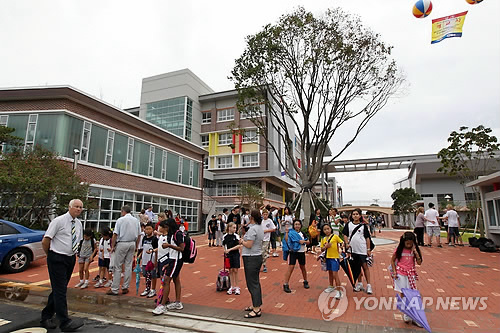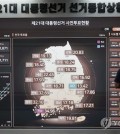- California Assembly OKs highest minimum wage in nation
- S. Korea unveils first graphic cigarette warnings
- US joins with South Korea, Japan in bid to deter North Korea
- LPGA golfer Chun In-gee finally back in action
- S. Korea won’t be top seed in final World Cup qualification round
- US men’s soccer misses 2nd straight Olympics
- US back on track in qualifying with 4-0 win over Guatemala
- High-intensity workout injuries spawn cottage industry
- CDC expands range of Zika mosquitoes into parts of Northeast
- Who knew? ‘The Walking Dead’ is helping families connect
8 in 10 international school students in Korea are Koreans

According to the report recently submitted to Rep. Jeong Jin-hoo of the minor opposition Justice Party, 77.7 percent of students at six foreign educational institutions in Free Economic Zones and Jeju Free International City were Koreans during the academic year 2013-2014. (Yonhap)
By Kim Rahn
Nearly eight in 10 students attending international schools in South Korea are Korean nationals, although the institutions were initially established to improve the educational environment for foreigners staying here, according to a report released by the Ministry of Education (MOE), Wednesday.
Moreover, the schools are not audited by the educational authorities.
According to the report recently submitted to Rep. Jeong Jin-hoo of the minor opposition Justice Party, 77.7 percent of students at six foreign educational institutions in Free Economic Zones and Jeju Free International City were Koreans during the academic year 2013-2014.
The six schools are: Chadwick International in Songdo; Daegu International School; Friedrich-Alexander University of Erlangen-Nurnberg (FAU) Busan Campus; George Mason University Korea; the State University of New York (SUNY) Korea; and SUNY’s graduate school.
Ghent University Global Campus and the University of Utah Asia Campus, which opened last September, were omitted from the report.
Koreans accounted for 80.7 percent of students at Chadwick; 62.4 percent at Daegu International; 94 percent at FAU Busan; 94.2 percent at George Mason; 78.7 percent at SUNY Korea; and 71.9 percent at SUNY graduate school.
According to the law, the quota of Koreans at international schools is limited to 30 percent of the total enrollment, and regional educational authorities can increase this to 50 percent.
But technically, the schools did not violate the regulation ― although 77.7 percent of currently attending students are Koreans, the total numbers of current students at the schools, either Koreans or foreigners, are far short of their maximum capacities they can admit at around 30 percent, according to Jeong. So, technically Koreans account for 23 percent of total enrollments.
“The special act on establishment and management of such schools stated that the purpose of the schools was to enhance the educational environment for foreigners residing here,” said the lawmaker. “Even though they did not violate the act technically, having such large percentages of Koreans is far from their original purpose of establishment.”
Jeong said that the government allowed enrollment of Korean students to international schools so that those schools can replace studying overseas. “But their tuitions were higher than schools in other countries. For the high school curriculum, Daegu International and Chadwick collect more than 40 million won per year, more than double the 19 million won that was the average tuition of students studying abroad in 2012.”
The lawmaker also pointed out that international schools do not undergo inspections by educational authorities due to a loophole in the law.
“The law says that the education ministry has only the right to supervise the schools but no right to audit them. Without the power of audit, the ministry cannot have any effective influence on the schools,” said Jeong.
Regional free economic zone authorities usually offer financial support to international schools in an effort to attract them to open there. The authorities can audit the schools’ accounts only for the money they provide. “Other factors about the schools such as admissions and management, are not under the control of any government authority,” Jeong said.
He is preparing to submit a revision bill to grant the audit power to the ministry.













Woden
February 11, 2015 at 4:06 PM
Why does the article include Jeju Free International City but a Jeju school was not among the schools listed? Doubtless the rate is just as high if not higher, but the article should be changed to avoid confusion.
Pingback: Korean Restaurant In Nurnberg | Locate a Restaurant
Pingback: Korean Restaurant In Nurnberg | Chefs Best Restaurants
moe
June 19, 2016 at 5:59 AM
Is there anyone to hold the admission or the system that excludes kids accountable? Is there anything that protects kids from racism? Who protects and serves the best interests of the kids at these schools?
tempat sampah plastik
December 15, 2017 at 11:00 PM
Kami adalah perusahaan terkemuka di bidang pembuatan dan penjualan tempat sampah dengan teknologi canggih inovatif. Sejak awal berdiri, rajatempatsampah.com telah memberikan kontribusi yang besar dalam pengembangan penanganan sampah dengan cara yang mudah, cepat dan higeinis. Motto kami adalah “FOR THE LIVING OF BETTER EARTH” perusahaan kami peduli pada masa depan bumi dan ingin mendorong orang untuk secara serius mengelola sampah dengan cara yang baik, sehat dan benar. Kami ada untuk kehidupan yang lebih baik bagi bumi kita ini. Melalui bantuan produk kami yang inovatif, kita wujudkan bumi yang sehat, bersahabat dan nyaman untuk kita tinggali.